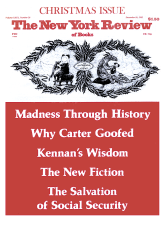In response to:
Good Men Are Hard to Find from the August 12, 1982 issue
To the Editors:
I believe Mr. Robert Towers when he says he wasn’t responsible for my latest novel, The Terrible Twos, being reviewed with Ms. Alice Walker’s The Color Purple [NYR, August 12]; nor do I hold him responsible for the inappropriate head, “A Good Man Is Hard To Find,” which introduced the review of my book and which, given the logic of the sequence, could be taken to mean that I am not a good man.
Whoever was responsible for the books being reviewed together should be informed that the practice has been criticized by Afro-American writers as racist for at least forty years, and such criticisms could hardly have stemmed from “wounded masculine pride,” since many of those who’ve complained in novels and essays have been women. (They also complain about the requirement by some white critics that they be “bitter.” I’m not bitter enough for Mr. Towers. Would Mr. Towers demand that a white writer be bitter?)
Would The New York Review of Books review books by Bernard Malamud and Norman Mailer in the same space because they are Jewish, or Flannery O’Connor and John O’Hara together because they were Irish?
Does The New York Review of Books hold a dated and provincial opinion that American literature is white, and that books by Afro-Americans, and others, constitute a separate literature, a field, like Sanskrit, worthy of investigation only by “specialists,” as Mr. Towers implies?
Mr. Towers is correct when he says that he didn’t use the phrase “inescapable criticism” in his review of my book, but when he criticizes my approach to characterization—an approach based upon my study of Afro-American folklore and art—and says, dogmatically, that “such criticism is inescapable,” it amounts to the same thing since the adjective, “inescapable,” modifies the noun, “criticism.”
The clause in the third paragrah of my letter, “he wouldn’t last a week as an art critic,” should be coherent to anyone who can read English and who read Mr. Tower’s review.
Mr. Towers wouldn’t survive as an art critic because no serious journal of painting would permit him to get away with the “slapdash” comparison of Roy Lichtenstein’s work with mine.
Ishmael Reed
Berkeley, California
The Editors replies:
We regret that Mr. Reed is offended. We did not intend to imply that he is not a good man.
Robert Towers replies:
To suggest that I require black writers to be bitter is nonsense. If I thought Afro-American literature was a specialized field like Sanskrit, I would never had the temerity to review Mr. Reed. On the other hand, he chides me in his first letter for overlooking several rather obscure works by black writers and in his second for not recognizing that his approach to characterization is based upon his “study” of Afro-American art and folklore. Obviously a no-win situation.
This Issue
December 16, 1982



